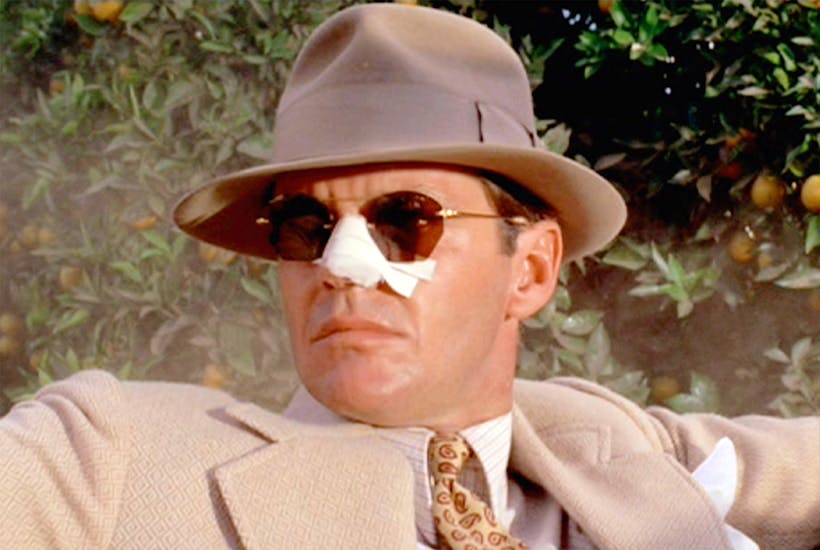In one of the most frequently quoted lines of post-war European cinema, a character in the 1976 Wim Wenders film Kings of the Road remarks that ‘the Yanks have colonised our subconscious’ (‘Die Amis haben unser Unterbewusstsein kolonialisiert’). The Hollywood film, a powerful weapon broadcasting this almost mythological vision of American culture around the world, had already begun its long retreat from complex adult themes, after untold millions were made from the colossal success of pictures by George Lucas and Steven Spielberg such as Jaws (1975), Star Wars (1977) and Raiders of the Lost Ark (1981), all of which became franchises. Last year, one of America’s greatest directors, Martin Scorsese, took aim at today’s superhero blockbusters:
That’s not cinema. Honestly, the closest I can think of them, as well made as they are, with actors doing the best they can under the circumstances, is theme parks.
A late masterpiece of film noir, Chinatown was released in 1974, and received 11 Academy Award nominations. Today, this bracingly jaundiced tale of nose-slicing, incest and rampant municipal corruption — with its unflinchingly downbeat ending in which the lead actress is shot dead by the police — would probably struggle to obtain funding, let alone a national cinema release. With no Forrest Gump-style platitudes and no syrupy conclusion, Chinatown presents the kind of complex, morally ambiguous world that readers of novels are more than happy to accept, but which these days cinemagoers are almost never allowed to experience in mass-market Hollywood product.
Sam Wasson’s book examines the origins, production and aftermath of this landmark film, largely by tracing the stories of four key individuals: the director Roman Polanski, the producer and Paramount Studios head Robert Evans, the screenwriter Robert Towne and the male lead actor Jack Nicholson. Much will be familiar territory to anyone who has read Evans’s entertaining memoir The Kid Stays in the Picture (1994), Polanski’s fine autobiography Roman by Polanski (1984) and Peter Biskind’s magisterial study of the 1970s Hollywood generation, Easy Riders, Raging Bulls (1998).
The scope here is deliberately narrower than that of Biskind. A lengthy section on the various drafts of the script will interest film students who have heard it praised as one of the greatest screenplays of them all, although the book really comes alive when describing the actual shooting of the film itself. There is much that is good here, and the narrative moves along in an almost novelistic, colloquial style. However, Wasson has an unfortunate habit of cherry-picking facts while ignoring others which may be inconvenient for his purposes. To state that by 1984 Nicholson was often making ‘amenable fluff’ such as The Witches of Eastwick is unwise, not only because that film is from 1987, but also because Wasson ignores Nicholson’s starring role in the gritty 1981 hardboiled crime feature The Postman Always Rings Twice.
Since Chinatown is set very specifically in the Los Angeles of 1937, Wasson’s title — a combination of The Big Sleep and The Long Goodbye by the supreme master of LA detective fiction, Raymond Chandler — is appropriate. However, the author downplays the importance of San Francisco’s Dashiell Hammett, who first mapped out the Chinatown of his own city as a noir location in stories such as Dead Yellow Women (1925) and The Maltese Falcon (1930). To write that the latter novel was ‘set in a San Francisco that could be Any City, USA’, despite Falcon referencing specific streets, buildings and bars, is plainly wrong. Another key link between Polanski’s film and the work of Hammett is of course that Roman persuaded John Huston, the director and screenwriter of the definitive film of The Maltese Falcon in 1941, to play a leading role as an actor in Chinatown.
Overall, Wasson has a tendency to give credit to the Evans era of Paramount Studios for the success of many who came within its orbit at the expense of their previous careers, especially if they took place in Europe. Alfie (1966) is said to have made a star of ‘newcomer’ Michael Caine — who had been in 19 films since 1950, most recently a little thing called The Ipcress File; and Polanski’s very fine early 1960s features such as Knife in the Water and Cul-de-Sac are given only the briefest mentions. This is perhaps understandable in a book by an American film writer who lives in LA, but both film noir and Chinatown itself were a product of the blending of US and European sensibilities, and all the stronger for that combination.
The films of the early 1970s, made in that brief window after censorship had eased and the theme parks had not yet taken over, have a resonance which still speaks to the viewer when any amount of On Golden Pond sentimentality has fallen by the wayside. Chinatown, with its bleak conclusion, has a key place among them, and a director whose mother was murdered at Auschwitz and whose wife was murdered by Charles Manson’s psychotic hippie followers was never likely to believe in conventional Hollywood endings.






Comments